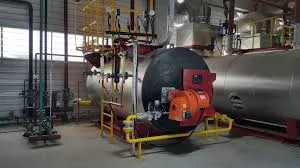
Nov . 13, 2024 10:34 Back to list
gas steam boiler efficiency
Understanding Gas Steam Boiler Efficiency
In the realm of industrial heating and power generation, gas steam boilers play a crucial role in ensuring process efficiency and energy conservation. These boilers convert water into steam using natural gas or other gaseous fuels, and their efficiency is vital for optimizing operational costs, reducing emissions, and enhancing overall system performance.
What is Boiler Efficiency?
Boiler efficiency is defined as the percentage of input energy that is converted into useful output energy. For gas steam boilers, this efficiency is typically calculated by comparing the useful energy output as steam to the energy input in the form of natural gas. The higher the efficiency, the less fuel is needed to produce the same amount of steam, which translates to lower operational costs and reduced environmental impact.
Factors Affecting Gas Steam Boiler Efficiency
Several factors influence the efficiency of gas steam boilers
1. Fuel Quality The type of gas burned and its quality can significantly affect efficiency. Higher calorific value gases yield more energy per unit of fuel, improving overall performance.
2. Heat Recovery Systems Modern gas steam boilers often integrate heat recovery systems, such as economizers, which capture waste heat from flue gases. This recovered heat can preheat the boiler feedwater, enhancing the energy efficiency of the system.
3. Operating Pressure and Temperature Different applications require varying steam pressures and temperatures. Optimizing the operating parameters can lead to improvements in efficiency, as reduced thermal losses can be achieved.
4. Boiler Design The design and construction of the boiler itself are paramount. Well-designed combustion chambers and heat exchangers maximize heat transfer and minimize energy losses. Innovations in materials and manufacturing techniques have also led to more efficient boiler designs.
5. Maintenance Practices Regular maintenance is essential for sustaining high boiler efficiency. Accumulation of soot and scaling inside the boiler tubes can reduce heat transfer, leading to increased fuel consumption. Routine inspections and cleaning are necessary to maintain optimal performance.
gas steam boiler efficiency

Measuring Efficiency
Boiler efficiency can be evaluated using several methodologies, the most common of which are the combustion efficiency method and the thermal efficiency method. Combustion efficiency assesses how well the fuel is burned, while thermal efficiency measures how effectively the boiler converts fuel energy into useful steam energy. Efficiency ratings are typically expressed in percentages and can guide operators in identifying areas for improvement.
The Importance of High Efficiency
Achieving high efficiency in gas steam boilers is imperative for both economic and environmental reasons. Increased efficiency leads to reduced fuel consumption, which directly lowers operating costs. Additionally, improved efficiency contributes to lower greenhouse gas emissions, aligning industrial practices with sustainability goals.
With rising energy costs and stricter regulations on emissions, industries are incentivized to invest in high-efficiency gas steam boilers and retrofitting existing systems with modern technology. Moreover, government initiatives and incentives for energy efficiency improvements encourage businesses to adopt more effective practices.
Future Trends in Gas Steam Boiler Technology
The future of gas steam boiler technology is promising, with ongoing research focused on innovative designs and the integration of smart technology. Automation and control systems are becoming more sophisticated, allowing for real-time monitoring and adjustments that enhance operational efficiency. The use of digital twins—virtual models of physical systems—enables predictive maintenance and optimization of boiler performance.
Furthermore, the push for greener energy sources is encouraging the exploration of hybrid systems that combine gas boilers with renewable energy technologies, such as solar or biomass systems. This hybrid approach not only enhances efficiency but also helps in reducing reliance on fossil fuels.
Conclusion
In conclusion, gas steam boiler efficiency remains a paramount consideration for industries reliant on steam for their processes. By understanding the factors that influence efficiency and adopting best practices for operation and maintenance, businesses can achieve significant cost savings while minimizing their environmental footprint. As technology continues to evolve, the future of gas steam boilers looks to be more efficient and environmentally friendly, paving the way for sustainable industrial processes.
-
High-Efficiency Commercial Oil Fired Steam Boiler for Industry
NewsJul.30,2025
-
High-Efficiency Biomass Fired Thermal Oil Boiler Solutions
NewsJul.30,2025
-
High Efficiency Gas Fired Thermal Oil Boiler for Industrial Heating
NewsJul.29,2025
-
High-Efficiency Gas Fired Hot Water Boiler for Sale – Reliable & Affordable
NewsJul.29,2025
-
High Efficiency Biomass Fired Hot Water Boiler for Industrial and Commercial Use
NewsJul.29,2025
-
High-Efficiency Biomass Fired Hot Water Boiler for Industrial Use
NewsJul.28,2025
Related PRODUCTS






















